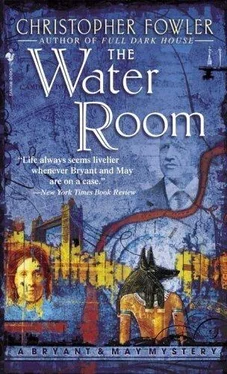Christopher Fowler - The Water Room
Здесь есть возможность читать онлайн «Christopher Fowler - The Water Room» весь текст электронной книги совершенно бесплатно (целиком полную версию без сокращений). В некоторых случаях можно слушать аудио, скачать через торрент в формате fb2 и присутствует краткое содержание. Год выпуска: 2006, Жанр: Детектив, на английском языке. Описание произведения, (предисловие) а так же отзывы посетителей доступны на портале библиотеки ЛибКат.
- Название:The Water Room
- Автор:
- Жанр:
- Год:2006
- ISBN:нет данных
- Рейтинг книги:5 / 5. Голосов: 1
-
Избранное:Добавить в избранное
- Отзывы:
-
Ваша оценка:
- 100
- 1
- 2
- 3
- 4
- 5
The Water Room: краткое содержание, описание и аннотация
Предлагаем к чтению аннотацию, описание, краткое содержание или предисловие (зависит от того, что написал сам автор книги «The Water Room»). Если вы не нашли необходимую информацию о книге — напишите в комментариях, мы постараемся отыскать её.
The Water Room — читать онлайн бесплатно полную книгу (весь текст) целиком
Ниже представлен текст книги, разбитый по страницам. Система сохранения места последней прочитанной страницы, позволяет с удобством читать онлайн бесплатно книгу «The Water Room», без необходимости каждый раз заново искать на чём Вы остановились. Поставьте закладку, и сможете в любой момент перейти на страницу, на которой закончили чтение.
Интервал:
Закладка:
‘Do you have any details?’
Rachel typed in a reference and hit Return . A viciously bright news-site unfurled on the screen before her. ‘Here you go. Roman chain recovered from a building site near Monument with a large number of its links intact-a very unusual find.’
‘Why so?’
‘Not many contractors can dig far down in the city because it’s a maze of tunnels, pipes and cables. Many new buildings are constructed on steel stilts to avoid the problem of digging out deep foundations. This site was lucky in that they found artefacts rather than ancient architecture.’
‘Why is that lucky?’
‘If you find building remains, you’ve got trouble on your hands, because construction keeps to a schedule, and usually you’re granted a matter of days to log your discovery before it gets filled in again.’
‘That’s barbaric.’
‘But where do you stop? In this city, the more you dig, the more you find.’ She let Bryant read the article. ‘The Victorians were keen on loading the lost rivers with mythological Roman connections. Some earl formed a society to navigate a path through the remains of the Fleet, looking for the Vessel of All Counted Sorrows.’
‘What was that?’
‘It was an Egyptian vessel supposedly constructed to contain all the woes, pains and miseries of the human race. The idea exists in virtually every religion and pagan creed, but takes on particular relevance in Roman mythology because most rivers of the Underworld burned through anything that was placed in them, and this vessel was therefore the only object that could survive such lethal waters. A sort of Pandora’s box that protected London as long as it remained underneath the city.’
‘Do you think it could have been an actual object? Perhaps a piece of pottery, something like that?’
‘Exactly so, Mr Bryant. I imagine it would have been a sealed clay dish of some kind, symbolically filled, and carved accordingly.’
‘What would they have done with it?’
‘What they always did.’ Rachel smiled. ‘Human sacrifice-probably a child, an innocent; casting of gifts on the waters, including the main offering, followed by a long boring ceremony, everyone goes home afterwards and gets drunk.’
‘Interesting. Tell me, have you come across a man called Jackson Ubeda?’ Bryant dug out the photograph May had given him.
‘How funny-that’s the guy who came to see us. Said he was related to the earl who founded the society. We let him work out some hypothetical routes on the computer simulation. I think he’s still registered with us.’ She tapped at the keyboard and ran a match through the site’s database. ‘Yes, he’s a subscriber.’
‘Are there any groups or individuals who make it their business to go down into the rivers?’
‘Only the Thames Water sewer gangs, but they’re checking for leaks and blockages, not historical artefacts. The rivers and the sewers are now interconnected, so it’s unsafe to venture in without supervision because of flash floods. Plus there’s a series of locked safety grilles that prevent access from one part to another, and many channels are dead ends.’
‘Suppose I wanted to get inside one of these tunnels and investigate for myself. What would I do?’
‘Find yourself an expert, pay him a lot of money and hope the law doesn’t catch you,’ said Rachel.
Funny, thought Bryant. That’s exactly how Gareth Greenwood was employed.
31. THE RIVER FINDS A WAY
The Holmes Road Working Men’s Hostel had once been a small Victorian sub-post-office, a fussy urban cottage of ginger brick and curling cream lintels, constructed on a human scale, that welcomed all. Now a pair of standard-issue council doors had been fitted over the front entrance, a wheelchair ramp had replaced the steps, and the ground-floor windows had been mesh-wired. Inside, eye-scorching fluorescent strips and lack of curtains lent the building an almost unbearable air of melancholic dislocation. The borough’s approach to rethinking the usage of such buildings rarely extended beyond slapping another coat of paint over frayed interiors.
Arthur Bryant was admitted to a small bare holding bay, and waited while the receptionist checked the register behind a wall of scratched plexiglass.
‘If you’ve come about admittance for longer than a single night, you’ll need a referral from your doctor,’ she said briskly.
‘I’m not a rough sleeper, I’m a Detective Inspector,’ Bryant complained. The receptionist eyed his threadbare overcoat disbelievingly. With a sigh of annoyance, Bryant pulled out his ID and slapped it on the window. ‘I’m looking for someone called Tate.’
‘You’re in luck,’ she declared, in a booming, institutional timbre that probably proved useful when dealing with the inebriated, but was guaranteed to annoy everyone else. She was the type born for a certain kind of council employment: proprietorial, frozen, rule-bound and battle-scarred, but on some basic level decent enough to care. She flicked the book shut and checked her key board. ‘He’s back in. Tate usually prefers to sleep rough. He stays out in all weathers. Says rooms make him claustrophobic.’
After examining the accommodation, Bryant could see why. Thin MDF partitions had carved the old sorting rooms into quarters, then eighths. Some dividers segmented windows and parts of the blue and white corridor. Each room was large enough for a single bed and a tiny plywood table. A communal dining room reeked of boiled stews and reheated gravy. There were notices about needles and fires and depression and missing persons, and, oddly, one about ballroom dancing.
‘How long has he been with you?’ Bryant asked.
‘I was only transferred here from Housing six weeks ago,’ explained the receptionist. ‘He doesn’t have much documentation beyond his health record, the usual alcohol-related pulmonary problems. He’s had pneumonia a couple of times. The next time will be his last. Admitted without any paperwork-nothing unusual about that, of course-but he does seem local to the borough. Everyone calls him Tate, although it’s not his real name. He hoards tins of golden syrup. He’s too far gone to remember how he might have been christened.’
‘How old is he?’
‘Probably in his late fifties. It’s hard to tell when they’ve lived rough for so long.’
‘Can I see him?’
‘You won’t get anything out of him. He doesn’t like to talk.’ The receptionist buzzed Bryant in and led him to the end of the first-floor corridor. She knocked briskly on the door and slipped her key into the lock before there was an answer. Tate was sitting on the edge of his bed, hands folded in his lap, staring through the condensation-smeared window. ‘I’ll leave you two alone,’ she said, then, raising her voice, added, ‘Lunch in ten minutes, Mr Tate.’
Bryant waited until her footsteps had been folded away by the swing-doors, then stood watching the street from the window. The room’s occupant had not acknowledged his presence.
‘I could watch a London street all day,’ Bryant remarked. ‘So many different types of people. Much more going on than in the old days.’
‘And you think that’s a good thing, do you?’ said the man on the bed. The voice was surprisingly cultured, but had perhaps lost its edge of late.
‘No, just different. More strangers now, coming and going. I used to know my neighbours.’
‘You’re the copper.’ Tate turned and studied him. ‘Are you going to keep that coat?’
‘This happens to be an old favourite,’ said Bryant, pulling the lapels closer.
‘I can see that. Am I under arrest?’
‘Well, we don’t like you sneaking into people’s gardens and watching them, because you upset them, but no, you’re not under arrest. What were you doing?’
Читать дальшеИнтервал:
Закладка:
Похожие книги на «The Water Room»
Представляем Вашему вниманию похожие книги на «The Water Room» списком для выбора. Мы отобрали схожую по названию и смыслу литературу в надежде предоставить читателям больше вариантов отыскать новые, интересные, ещё непрочитанные произведения.
Обсуждение, отзывы о книге «The Water Room» и просто собственные мнения читателей. Оставьте ваши комментарии, напишите, что Вы думаете о произведении, его смысле или главных героях. Укажите что конкретно понравилось, а что нет, и почему Вы так считаете.












